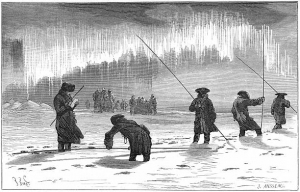Items filtered by date: May 2020
Maupertuis: a threat to the paradise of Cirey?
Pierre-Louis Moreau de Maupertuis was a famous mathematician and physicist whose achievements are all familiar to scientists today. He is also part of a love triangle with Voltaire and Émilie du Châtelet, in the opera Émilie & Voltaire that Nicholas Gentile is developing to my libretto and with the generous sponsorship of Fine Music Sydney, Andrew Su, the City of Melbourne and the major sponsor, Opera Australia. Maupertuis's role in the short opera film of the same name is played by brilliant tenor, John Longmuir. More in this blog when we have completed the film!
Maupertuis was born in the picturesque seaport of Saint-Malo in Brittany. His father was one of its important shipping merchants known as corsairs, who also practised as privateers against foreign vessels and even as pirates. The vast wealth that Monsieur Moreau earned from the sea passed to his son, and so did his noble name, de Maupertuis, granted to the family by King Louis XV not long before Pierre-Louis was born.
Maupertuis received an excellent education. Like many active young men of the nobility he became an army officer, but he soon discovered that his real interest was mathematics. Being rich, energetic and clever, he could make his own choices in life. He went to Basel, Switzerland, to study with the great mathematician, Daniel Bernoulli. Maupertuis proved to be an original thinker, his work was widely read and in 1723 he was admitted to the French Academy of Sciences.
Maupertuis was a Newtonian: that is, he believed with Englishman Isaac Newton that the movement of the spheres in the universe operates according to forces such as gravity, and that the laws of nature can all be expressed in the language of mathematics. This put Maupertuis in opposition to most of the Academy, who supported the theories of the Frenchman, Descartes.
Scientific debate was also fashionable in the Paris salons, where Maupertuis was a favourite because of his sparkling intelligence, his wit and his success with the ladies. In 1733, Voltaire began to take lessons from Maupertuis in mathematics, and they became friends. Voltaire, deeply in love with the beautiful and learned Émilie du Châtelet, hired Maupertuis as her mathematics tutor also. Rumour had it that Maupertuis briefly became her lover, though he played somewhat hard to get, and they parted when Émilie left Paris in 1735 to live with Voltaire at her Château de Cirey in the remote Champagne region.
Then came Maupertuis’s great expedition, which made him famous in France and throughout the scientific world as ‘the man who flattened the Earth’. In 1736 he led a team of scientists and surveyors to Lapland under royal commission, to prove Isaac Newton’s theory that the Earth is not a perfect sphere, but is relatively flatter at the Poles.

